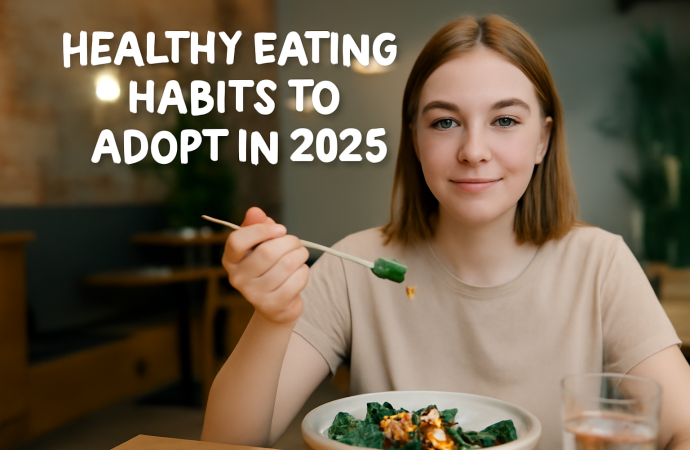Introduction As we enter 2025, many people are looking to make healthier choices in their diets. Healthy eating habits are not just about following the latest diet trend but about making long-term, sustainable changes to improve your health. Adopting better eating habits can boost your energy, improve your mental clarity, and help you maintain a
Introduction
As we enter 2025, many people are looking to make healthier choices in their diets. Healthy eating habits are not just about following the latest diet trend but about making long-term, sustainable changes to improve your health. Adopting better eating habits can boost your energy, improve your mental clarity, and help you maintain a healthy weight.
In this article, we’ll explore the best healthy eating habits to adopt in 2025. From incorporating more plant-based foods into your meals to making smarter food choices at the grocery store, we’ll cover practical tips to help you eat better and live a healthier life.
What Are Healthy Eating Habits?

Image by: Yandex.com
Healthy eating habits are patterns of eating that help you nourish your body, keep you physically active, lose weight, reducing risks, prevent illness, and maintain blood sugar level or energy levels. It’s not about restricting yourself or following an extreme diet. Instead, it’s about making balanced, nutrient-dense food choices that support your well-being.
In 2025, the focus is on more sustainable eating, with an emphasis on plant-based diets dairy products, fruit juice, local produce, and mindful consumption. Healthy eating involves nourishing your body with the right foods, avoiding excess sugars and fats, and maintaining a balanced, varied diet.
Top Healthy Eating Habits to Adopt in 2025

Image by: Yandex.com
1. Eat More Whole Foods and Less Processed Food
One of the key healthy eating habits to adopt in 2025 is to focus on eating more whole foods and less processed food. Whole foods, such as fresh fruits, vegetables, lean meats, and whole grains, provide essential nutrients without the added sugars, unhealthy fats, and preservatives found in processed foods.
Why It Matters:
Processed foods can be high in sodium, sugars, and trans fats, which contribute to weight gain and increase the risk of chronic diseases. By focusing on whole foods, you’re giving your body the nutrients it needs to function optimally.
Tips for Eating More Whole Foods:
- Choose fresh produce over canned or frozen versions.
- Opt for whole grains like brown rice, grain breads, quinoa, and oats instead of refined grains.
- Avoid fast food and processed snacks as much as possible.
2. Increase Your Intake of Plant-Based Foods
In 2025, more people are turning to plant-based diets as part of their healthy eating habits. Whether you go fully plant-based or just add more plant-based meals to your diet, eating more fruits, vegetables, legumes, and whole grains is a great way to improve your health.
Why It Matters:
Plant-based foods are high in fiber, vitamins, minerals, and antioxidants that support overall health. They are also lower in calories and unhealthy fats, making them great for weight management.
Tips for Eating More Plant-Based Foods:
- Try meatless Mondays and swap animal products for plant-based alternatives like tofu or lentils.
- Include more vegetables and fruits in your meals by adding them to soups, smoothies, and salads.
- Experiment with plant-based proteins like chickpeas, black beans, and quinoa.
3. Plan Your Meals in Advance
Meal planning is one of the best ways to stick to healthy eating habits. By planning your meals ahead of time, you can ensure that you have healthy options ready and avoid reaching for unhealthy snacks when you’re hungry.
Why It Matters:
When you don’t plan your meals, it’s easy to make quick, unhealthy choices. Meal planning also helps you save time and money, as it allows you to buy ingredients in bulk and reduce food waste.
Tips for Effective Meal Planning:
- Prep meals on the weekend so you have healthy options ready throughout the week.
- Plan balanced meals that include lean proteins, whole grains, and healthy fats.
- Keep healthy snacks like fruits, nuts, and yogurt on hand for quick, nutritious bites.
4. Mindful Eating: Pay Attention to What You Eat
In 2025, mindful eating will become an even more important part of healthy eating habits. It involves paying attention to how, when, and why you eat. Mindful eating encourages you to slow down, enjoy your food, and tune into your body’s hunger cues.
Why It Matters:
Eating mindfully can help you recognize when you’re full and prevent overeating. It also helps you enjoy your food more, leading to a better overall eating experience.
Tips for Mindful Eating:
- Chew slowly and enjoy the flavors of your food.
- Avoid distractions like TV or phones while eating.
- Pay attention to your hunger and fullness signals to prevent overeating.
5. Stay Hydrated with Water
Drinking enough water is one of the simplest but most important eating patterns. Water is essential for digestion, nutrient absorption, and maintaining energy levels.
Why It Matters:
Many people confuse thirst with hunger, which can lead to overeating. Drinking water regularly helps your body stay hydrated and supports overall health.
Tips for Staying Hydrated:
- Drink water throughout the day, aiming for at least 8 glasses.
- Carry a water bottle with you to remind yourself to drink.
- Add a slice of lemon or cucumber to your water for added flavor and benefits.
6. Limit Sugar and Refined Carbs
Reducing your intake of sugar and refined carbs is essential for 2025’s healthy eating habits. These foods contribute to weight gain, energy crashes, and an increased risk of chronic diseases like diabetes and heart disease.
Why It Matters:
Sugar and refined carbs (like white bread and pasta) spike your blood sugar, leading to cravings and overeating. Instead, focus on whole foods that provide steady energy without the sugar crash.
Tips for Reducing Sugar and Refined Carbs:
- Replace sugary drinks with water, unsweetened teas, or infused water.
- Choose whole grains over refined carbs.
- Check food labels to avoid hidden sugars in processed foods.
The Future of Healthy Eating Habits in 2025

Image by: Yandex.com
The future of healthy eating habits in 2025 looks promising, with more health benefits and people becoming aware of the importance of nutrition. We can expect to see an increase in plant-based and sustainable food choices as people seek healthier and more eco-friendly options. Personalized nutrition will also become more common, with technology helping individuals track their health and suggest the best foods for their bodies. As the demand for healthy foods grows, more companies will likely offer convenient, nutritious options that make eating healthy easier and more accessible. In the future, healthy eating will be more about finding a balance that fits individual needs while also considering the planet’s well-being.
Comparative Table: Healthy Eating Habits to Adopt in 2025
| Healthy Eating Habit | Why It Matters | Tips to Implement |
|---|---|---|
| Eat More Whole Foods | Reduces processed foods and boosts nutrition | Choose fresh fruits and vegetables |
| Increase Plant-Based Foods | Rich in fiber, vitamins, and antioxidants | Try meatless meals and plant proteins |
| Meal Planning | Helps avoid unhealthy choices and saves time | Plan balanced meals for the week |
| Mindful Eating | Prevents overeating and improves digestion | Slow down and enjoy your food |
| Stay Hydrated | Keeps you energized and supports digestion | Drink at least 8 glasses of water daily |
| Limit Sugar and Refined Carbs | Reduces cravings and stabilizes energy levels | Avoid sugary drinks and refined grains |
Conclusion
Adopting healthy eating habits in 2025 is about making small, sustainable changes that will improve your overall well-being. By focusing on whole foods, reducing sugar, and incorporating more plant-based meals, you can enhance your health, feel better, and enjoy life more.
The key is to find habits that work for you and fit your lifestyle. Whether it’s meal planning, mindful eating, or drinking more water, every step you take towards healthier eating will have long-term benefits.
















